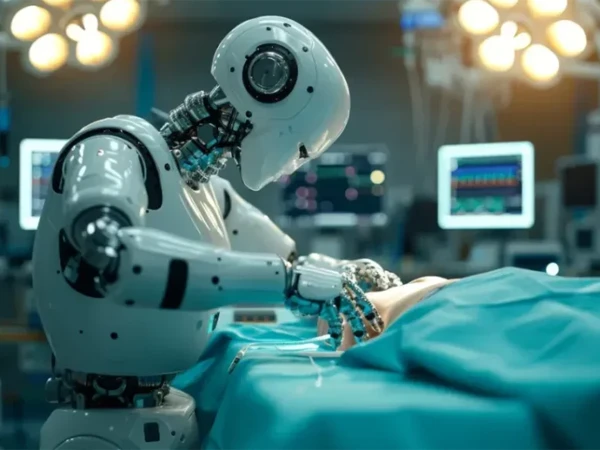International medical experts say that artificial intelligence (AI) has the ability to catch subtleties in fields such as internal medicine and radiology that sometimes go unnoticed even by expert doctors. AI can identify things in CT scans that the human eye ignores, which is why AI is rapidly changing various areas of the medical field, including surgery and research.
Medical experts affiliated with Columbia University in New York expressed their views at a two-day workshop on modern techniques in laparoscopy and weight loss (bariatric) surgery held at Jinnah Hospital Karachi.
The workshop was attended by George S. Ferzley, Professor of Surgery at Columbia University in New York, and his fellow Dr. Alexander Wu.
On this occasion, surgical residents and postgraduates were given practical training in modern techniques. The workshop aimed to introduce safe, effective and international standard surgical methods.
Jinnah Hospital Karachi Executive Director Professor Shahid Rasool said that we regularly organize workshops in which we invite international experts to learn new techniques. Professor George S. Ferzli from Columbia University, New York, participated in this workshop. He is a professor of surgery. He is an expert in general surgery and weight loss surgery. He informed our PG and postgraduate students about the safe and effective methods of various surgeries.
The head of Jinnah Hospital said that I have worked with experts in many countries of the world and have learned something new from every experience. When we practice new techniques under the supervision of experts in such workshops, the possibility of mistakes is reduced. Before learning robotic surgery, it is necessary to master laparoscopic surgery. Robotic surgery cannot replace laparoscopic surgery even in the next 20 years, because both have their own separate roles.
Dr. Alexander Wu said that there is no better place to discuss the development of artificial intelligence (AI), especially when there are people who are innovators themselves. In the early 90s, laparoscopy was coming and open surgery was common. Even then, it took courage and acceptance to adopt new technology. Then laparoscopy was adopted and its potential was seen.
He said that the situation is the same today, there is no doubt that artificial intelligence is going to take over and change the field of medicine. We are already seeing its effects, patients now want to know about their diseases and medicines themselves, and they turn to AI models like ChatGPT. Currently, the fields where AI is having the most impact are internal medicine and radiology. We see that AI sometimes identifies things on CT scans that we doctors can’t even see, because many things have become medically too complex and overwhelming.
He added that AI is having an impact on surgery in two ways. The first way is that AI is looking at results and research based on large amounts of data to come up with new models, learning methods and predictions that surgeons will use to improve their surgeries before or after the operation. Now research is no longer just research, because humans cannot process such a large amount of data on their own, this work is now being done by AI. The second way is in the form of robotic surgery, which is developing rapidly. Every time you move a robot, companies and programs record every step of your surgery and link it to the results. There may come a time when we can model the movements of robots so that they can perform surgeries themselves. We are still far from that point. But despite all this, we will still be in the operating rooms and performing surgeries.
Dina Hani, a resident at New York University (NYU), said that she is a graduate of Ziauddin University and is now a fourth-year surgery resident at NYU.
She said that the experience of working with the surgical team in Karachi was very welcome and the postgraduates here have immense potential.
She said that she tried her best to transfer the training and technical skills acquired in New York here. According to her, some new techniques were introduced and it was good to see that the surgical equipment and technology available here are also of international standard.
Later, the oath-taking ceremony of Pakistan’s first and only officially registered society, Pakistan Society of Metabolic and Bariatric Surgery (PSMBS), was held.
The event was held under the supervision of Dr. Surinder Davani, President of the Sindh Chapter. The society was established in 2017 and is now headed by Prof. Dr. Shahid Rasool, who is also the Executive Director of Jinnah Postgraduate Medical Center.
Its aim is to make the treatment of obesity a disease in Pakistan possible at every forum.
Medical experts say that bariatric surgery can not only control obesity but also effectively control many diseases associated with it such as diabetes, blood pressure, cholesterol and knee pain.
The doctors reiterated their commitment that the society will play an active role not only in treatment but also in the field of awareness, research and policy making so that the health crisis related to obesity in Pakistan can be controlled.
